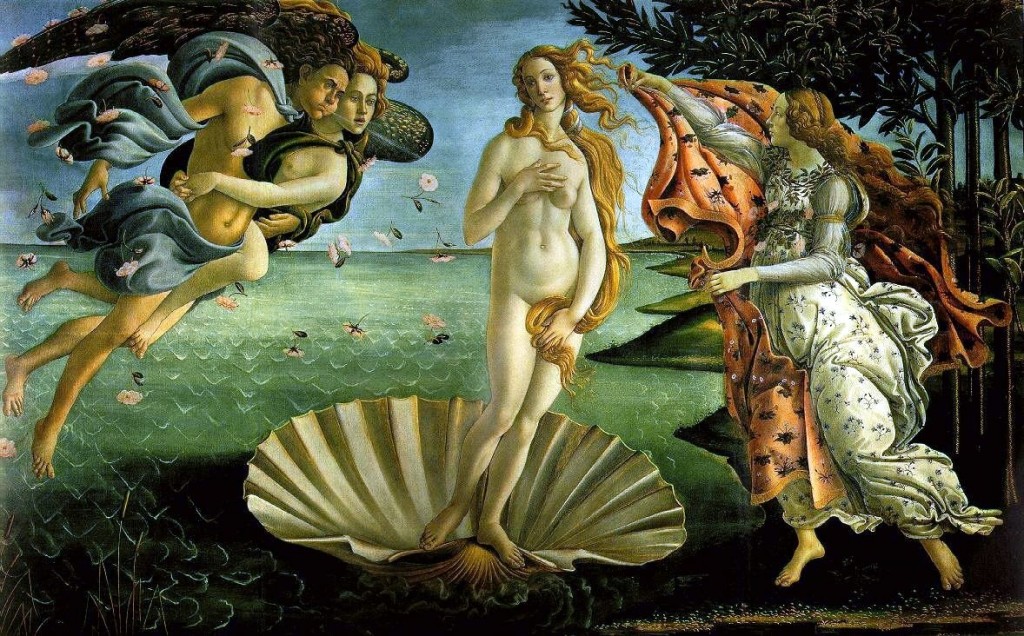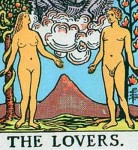Withdraw into yourself and look. And if you do not find yourself beautiful yet, act as does the creator of a statue that is to be made beautiful … cut away all that is excessive, straighten all that is crooked, bring light to all that is in shadow; labor to make all one glow of beauty and never cease chiseling your statue until there shall shine out on you from it the divine splendor of virtue…
Plotinus (204-270 CE), Poem n° 3665, Enneads, I:9;
from Porphyry, Life of Plotinus, G. Turnbull trans., 1936; p. 49.
I who am the beauty of the green Earth
Late April and the first three weeks of May are the time when the sun is in considered to be in the zodiac sign of Taurus, which is ruled by the planet Venus. Venus is named after the Roman Goddess of love and beauty. In the Western mystery tradition, she is associated with the color green, the color of growth and fertility. In ancient Roman Paganism, she was a Goddess of the erotic realm, but she was also the Goddess of agriculture. Lady of vegetable gardens and vineyards, she brings the gift of cultivation of food, which is the basis of human civilization.
The Pagan festival that is widely celebrated at this time – May Eve or Beltane – celebrates the warmth of the sun, the blossoming of nature, fertility of crops and animals, and abundance in the natural world. It is the time before the sun’s peaking at Midsummer. Around us the birds sing, flowers bloom, trees blossom – everything is joyous.
In the human life cycle, the Beltane season equates to our 20s and 30s, before our lives reach their mid-point and their peak of achievement. It is a time when there is all to play for, hope abounds, nothing has begun to wither, and we are at our most physically attractive. Human sexuality is also at its peak.

Loving you, loving me
Venus and her sisters in other pantheons are important deities. Venus reminds us of the gift of living in a human body, of the pleasure we can find in physical incarnation, and of the physical joy we can give to others. Many spiritual traditions have an ambiguous relationship with the body and its desires; but a Pagan outlook can celebrate the joy of being in a body and experiencing the world around us through its highly evolved sensory systems. Our sensory capacities give us ways of relating to others. Touch, sensuality and sexuality enable human beings in separate bodies to bridge the boundary between self and other and to break through the sense of isolation that can be the downside of contemporary life. Sensuality does not necessarily mean sexuality. We can honor Venus by simple acts of loving behavior to partners, friends and family. Taking someone’s hand, a kiss, a touch, a massage, all these break the barrier of physical isolation and remind someone else of their worth.
To allow loving sexual intimacy with another requires trust and letting go of emotional barriers. To let go and trust, we need to value ourselves and to believe we can be loved by others. Our confidence in our appearance and physical desirability is easily undermined. Much of life today is dominated by the more superficial aspects of Venus’ realm of beauty. When the Pagan philosopher Plotinus wrote about making ourselves beautiful, he was talking about beauty of spirit, not bodily beauty; but we are constantly pressurized by commercial interests to make a beautiful appearance one of our ultimate goals. This is a dangerous trap because physical beauty is an ideal, not reality. Most of us do not match up to the airbrushed images that the media show us. This is one of the reasons for the popularity of gossip magazines’ images of off-duty ‘celebs’, when they are not dressed up, made up and ready for the camera. But even though rationally we know that the media images are unreal, it is easy be sucked into judging ourselves by ephemeral ideas of physical perfection dictated by fashion designers.
We can value ourselves better if we remember that we are more than our bodies and that the body is a gift – a perishable gift with an expiry date. We have very little time to experience life in it. Human life spans are tiny in the context of the time spans of the universe around us, so let us enjoy the gift and honor the Goddess by caring for it both inwardly and outwardly, but without being fixated by it.
Honoring Venus – slowly
The astrological sign of the first weeks of spring is Aries, the Ram; a sign associated with fiery, impetuous energy. The sign of Taurus that follows is slower and more thoughtful – think of cows chewing the cud. This slowness is a clue to something that we need both spiritually and physically.
Spiritually, we need time to digest the experiences we have every day and to extract from them nutrition for the spirit. This means building into the hectic routine of our lives times for quiet, meditation and reflection, when we think about how we have spent the day, how we have interacted with others, and what we would like to do differently. We do not need to sit for hours in a meditation hall to achieve this. A few moments each day can help us focus on what has been important and what we can learn from it for the work of self-creation, which is our life’s work.
Slowness is also important physically. It is hard to live a spiritually fulfilling life if we are exhausted, stressed and take no time to care for our physical selves. One of the Venusian pleasures we can most enjoy with others is cooking and eating. In 1986, Italian writer Carlo Petrini started the Slow Food movement to encourage the growing, cooking and enjoyment of sustainable food. The spirit of the Slow Food movement is a good one to adopt for Beltane. Creating a celebratory meal of good quality fresh food and taking time to enjoy it with friends and family reminds us of important messages of Venus and of the Beltane season – about our bodies, our relationships with one another, and how we relate to nature and the food that sustains us.
Prayer to honor Venus
Laughter-loving Goddess
brought to us on the foaming waves of creation
in the dawning of the world,
we greet you, Morning Star,
Lady of hope and promise.
With the setting of the sun,
the dying of our days,
we honor you, Evening Star of the Sea.
Burn for us in the darkness brightly,
and steer us to safe harbor.
















